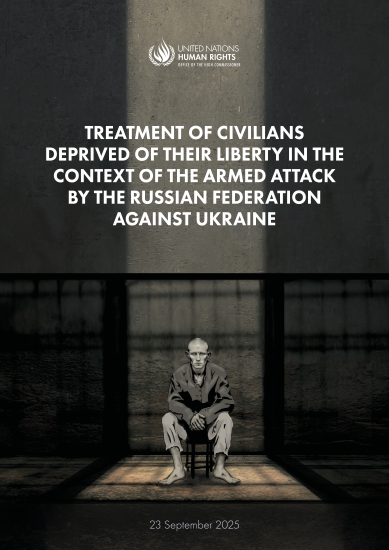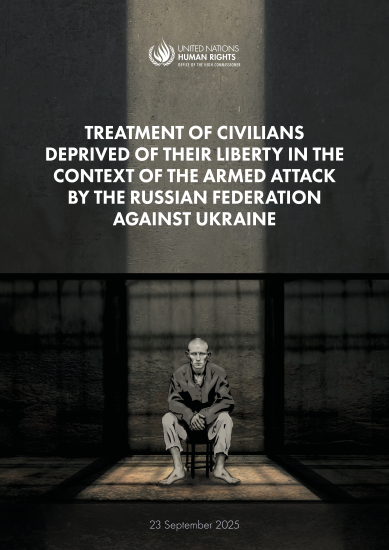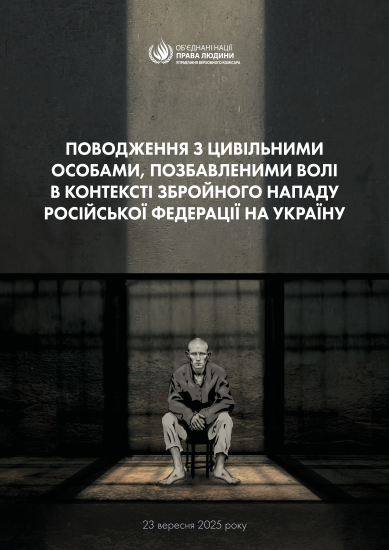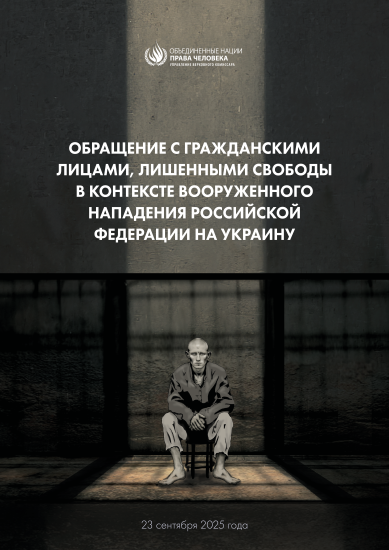Treatment of civilians deprived of their liberty in the context of the armed attack by the Russian Federation against Ukraine

👉 Click here for an illustrated webstory about the report's key findings
EXECUTIVE SUMMARY
1. Large-scale deprivation of liberty, affecting both of civilians and military personnel, remains a stark reality in the ongoing armed attack of the Russian Federation against Ukraine. Building on previous OHCHR findings, this report describes the treatment of civilians deprived of their liberty for reasons related to the armed conflict since 2022.
2. The Russian Federation and Ukraine have detained distinct groups of civilians for different reasons and lengths of time. Notwithstanding those differences, international humanitarian law (IHL) and international human rights law (IHRL) prescribe common minimum standards for the fair and humane treatment of detainees. Civilians can only be detained on grounds lawful under international law and must be released from detention as soon as the lawful grounds for their detention cease to exist.
3. The Russian Federation has detained Ukrainian citizens on occupied territory where it is bound by its obligations as an occupying Power under IHL, complemented by concurrently applicable IHRL. This report establishes that the Russian Federation has subjected Ukrainian civilian detainees to serious violations of IHL and IHRL. In particular:
i. The Russian Federation applies Russian criminal law in occupied territory of Ukraine, ignoring the obligation under IHL to respect – unless absolutely prevented – the laws in force in the occupied territory. It did not develop a procedure for the internment of civilians as foreseen by IHL.
ii. Torture and other forms of cruel, inhuman or degrading treatment or punishment (torture and ill-treatment), including sexual violence, have been applied in a systematic and widespread manner against civilians in places of detention.
iii. Frequent violations of applicable legal conditions and procedural safeguards governing deprivation of liberty have resulted in arbitrary detention, and in a significant number of cases appear to have given rise to enforced disappearances.
iv. The cumulative effect of these measures, combined with a lack of accountability, has placed many Ukrainian civilians outside the effective protection of the law during their detention.
v. High numbers of Ukrainian civilian detainees remain arbitrarily detained by Russian authorities in occupied territory of Ukraine and the Russian Federation for reasons or actions related to the armed conflict, often held in dire conditions, without the possibility of relief.
4. In territory under its control, Ukraine has detained mainly its own citizens on charges related to national security under the framework of domestic criminal law, where it is bound by IHRL. Since the full-scale armed attack by the Russian Federation, the increased number of conflict-related detainees has placed additional burdens on the criminal justice system of Ukraine. While authorities have taken steps to ensure procedural safeguards and improve detention conditions, concerns remain. OHCHR continued to document instances of torture and ill-treatment of conflict-related detainees by Ukrainian authorities, and accountability remained limited.
5. The accession process of Ukraine to the European Union offers an opportunity to analyze comprehensively the risk factors in the penitentiary system for torture and ill-treatment and strengthen safeguards and accountability in line with a human rights-based approach. The Ukrainian Government must also ensure respect for the rights of all individuals who are transferred to the Russian Federation as part of diplomatic efforts to secure the release of Ukrainian citizens from Russian detention, in particular in relation to free and informed consent and non-refoulement.



